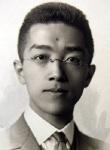The case of Hu Shih as the 'Greatest Cornellian' | Cornell ...
www.news.cornell.edu/stories/2014/11/case-hu-shih-greatest-cornellian
The case of Hu Shih as the 'Greatest Cornellian'
ByAaron Coven

Hu Shih
Students and professors gathered in the Milstein Hall auditorium Nov. 20 to hear Sherman Cochran, the Hu Shih Professor of Chinese History Emeritus, present the Cornell Contemporary China Initiative’s inaugural lecture, “The Greatest Cornellian: Hu Shih, Class of 1914.”
Hu Shih was born in China in 1891, Cochran said. His father, a public official, died when he was 3 years old. Hu Shih pursued a Westernized education in China and won a Boxer scholarship that brought him to Cornell initially to study agriculture, although he later changed to philosophy.
Cochran framed his lecture as a comparison between Hu Shih and other Cornell graduates. He discussed Supreme Court Justice Ruth Bader Ginsburg ’54, novelist Thomas Pynchon ’59, and professional football player and actor Ed Marinaro ’72.
Hu Shih held several important positions in Chinese academia, serving as a professor, dean and eventually president of Peking University, but he was also prominent in Chinese politics, Cochran said. Hu Shih served as Chinese ambassador to the U.S. prior to World War II, a crucial period in relations between the two countries. Hu Shih was also offered the vice presidency and presidency of the Chinese nationalist government. He declined both positions and criticized nationalist leader Chiang Kai-shek. Cochran said “Hu Shih performed admirably” as a leader in public life.

Cochran
Despite Hu Shih’s work as a public official, Cochran said he felt that Hu Shih’s greatest accomplishments were as a writer. By the age of 4, Hu Shih had already mastered 1,000 Chinese characters. He won the Boxer scholarship as a result of his writing prowess, and while studying at Cornell, he won a prize for writing the best essay by a Cornell undergraduate. After returning to China after graduate studies at Columbia University, Hu Shih became the “most influential writer in the country”; his diary, which he published while still at Cornell, became widely read. According to Cochran, Hu Shih was an “intellectual rebel“ who campaigned for language reform, defending “the use of the vernacular” rather than the classical form of writing the Chinese language.
Cochran’s final selling point for Hu Shih’s candidacy as the greatest Cornellian was his celebrity. Hu Shih gained a following among readers of his diary, and he was especially popular among women. Cochran also detailed Hu Shih’s acclaim among “young Chinese” and said Hu Shih was featured in newspapers, magazine, journals and books. It was not uncommon for Hu Shih to be referred to as “my friend,” even by those who had never met him, said Cochran.
“Even if we acknowledge that Hu Shih was not the match of anyone of these [other figures] in a certain aspect or another, doesn’t he surpass them all in the breadth – the sheer breadth – of his achievements? He was a public figure and a writer and a celebrity. It’s like saying that he was Ginsburg, Pynchon and Marinaro all rolled into one,” Cochran said.
Aaron Coven ’16 is a writer intern for the Cornell Chronicle.
最偉大的康乃爾人:胡適,1914級校友
沒有留言:
張貼留言